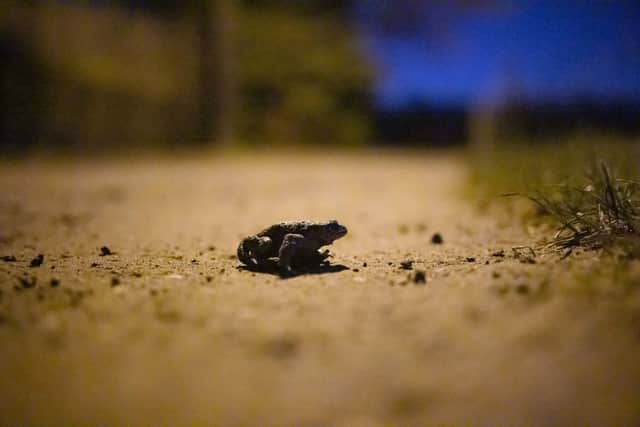Toad Patrol: Bath-based group 'bucking the trend' for UK's threatened amphibians - with best year since 2010
and live on Freeview channel 276
Closing the road for migrating toads appears to be helping the amphibian population in one part of Somerset flourish, where so many others are declining.
In February, Charlcombe Lane - a popular shortcut in Bath - closed for six weeks to help protect the local toad population, as they woke up from their winter slumber and headed to a local breeding pond. The annual street closure is the result of close work between nature-loving volunteers and local authorities, and new data on this year’s migration season suggests it’s paying off.
Advertisement
Hide AdAdvertisement
Hide AdMore than fifty volunteers with the local ‘toad patrol’, part of a nationwide scheme to help migrating amphibians organised by conservation charity Froglife, helped 3,177 frogs, toads, and newts across the half-mile stretch of road during the 2024 migration season. The patrol saw the second highest number of amphibians recorded since road closure started in 2003, the best it has been in 14 years. It was also the busiest year on record for newts - and the best for toads since 2013.
Throughout the six week road closure, volunteers from the Charlcombe Toad Rescue Group spent more than 600 hours in hi-vis jackets, armed with torches and buckets walking slowly up and down the road at dusk. The amphibians were carefully picked up from the road and transported safely in buckets to drop off points, to help them on their journey towards the lake.


Group manager Helen Hobbs said that closing Charlcombe Lane, with the support of their local community, had been a game changer for the local amphibian population. “It has meant that toads, frogs and newts have been able to buck national trends and stand a fighting chance of flourishing.”
“The biggest challenge this year was that the busiest night of the year was on the 6 February – a week before the road was due to close. In that one night our brilliant volunteers helped 647 amphibians across the road but sadly the casualty rate was much higher than usual because vehicles could still use the lane,” she continued.
Advertisement
Hide AdAdvertisement
Hide Ad“That is why it is so important to have the lane closed for the six weeks. With a changing climate it is becoming increasingly difficult to predict the peak times for amphibian movements. This year it was early February, and in 2023 it was mid-March.”
Back in 2016 a team of scientists used data collected by toad patrols across the UK to explore what had been happening to the common toad population. The research found that numbers had fallen 68% in just 30 years.
The biggest challenges amphibian faced today include road traffic, loss of habitat - such as the disappearance of ponds, and the fragmentation of their habitats due to intensified farming and development. The changing climate is also adversely affecting amphibians, the Charlcombe Toad Rescue Group said, with milder winters leading to them waking up from hibernation earlier, and more frequently.
While there were more than 200 toad patrols across the UK helping amphibians during migration season, Charlcombe Lane is one of only three road closures nationwide. Bath and North East Somerset Council has supported the patrol and road closure since 2003, the group said, however, the volunteers had to fundraise to pay the administrative costs for closing the road each year - while VolkerHighways sponsored the group by providing signage.
Advertisement
Hide AdAdvertisement
Hide AdAll the data collected by patrollers is collated by Froglife, which said that in 2023 more than 115,000 amphibians were given a helping hand across A-roads and quiet country lanes alike. Froglife operations manager Sheila Gundry added: “It's fantastic to see that the numbers of amphibians at Charlcombe Lane are so good this year. Froglife's data from many toad patrols around the country shows that amphibian populations are declining and are very depleted in many areas of the country.
“At Charlcombe Lane there is still a healthy population, thanks to the hard work of the toad patrol who rescue toads, frogs and newts, even on wet winter evenings,” she said. “The temporary road closure makes a big difference too, as do the surrounding landowners who look after the breeding pond and foraging grounds. It is wonderful to have such a good news story of people and wildlife working so well together."
Amber Allott is NationalWorld’s environment and sustainability specialist, covering all things green - from climate to conservation. If you liked this article you can follow Amber on X (Twitter) here and sign up for the free daily NationalWorld Today newsletter here - with Amber bringing you the UK's most important, pressing, weird and wonderful environmental stories every Tuesday.
Comment Guidelines
National World encourages reader discussion on our stories. User feedback, insights and back-and-forth exchanges add a rich layer of context to reporting. Please review our Community Guidelines before commenting.
